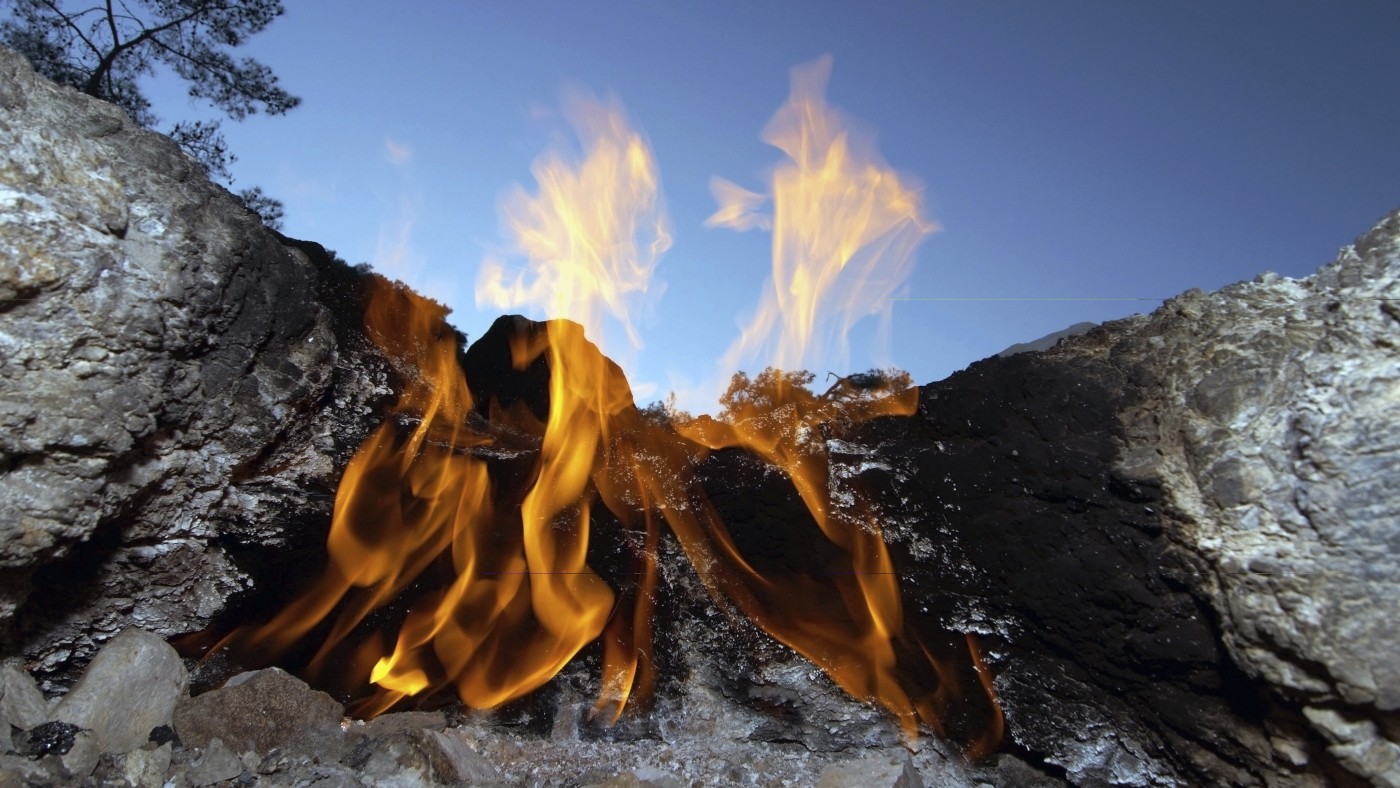Gold hydrogen: a near limitless supply of clean fuel?
Huge deposits found in northern France but major energy companies are holding back, for now

A free daily email with the biggest news stories of the day – and the best features from TheWeek.com
You are now subscribed
Your newsletter sign-up was successful
Start-ups are scrambling to discover sources of so-called "gold hydrogen" after experts said the low-cost, low-impact energy could be an environmentally friendly game-changer.
A recent discovery means that the planet could contain "near-limitless clean fuel", said New Scientist, but experts are also urging caution as the hype builds.
So what is gold hydrogen, how much of it could be under our feet and is it really as useful as has been claimed?
The Week
Escape your echo chamber. Get the facts behind the news, plus analysis from multiple perspectives.

Sign up for The Week's Free Newsletters
From our morning news briefing to a weekly Good News Newsletter, get the best of The Week delivered directly to your inbox.
From our morning news briefing to a weekly Good News Newsletter, get the best of The Week delivered directly to your inbox.
How is hydrogen currently obtained?
Hydrogen will be an "essential fuel in years to come", said the BBC, because it does not produce CO2 when used as a fuel or in industrial processes. But the "big drawback", according to the Carbon Trust, is that less than 1% of current global hydrogen production is emissions-free.
Currently, we have to make hydrogen ourselves, which involves using energy and producing pollution. Grey and blue hydrogen are produced by splitting methane into carbon dioxide and hydrogen, with the CO2 captured and stored in the latter case. Black hydrogen is produced by partially burning coal and there's also pink hydrogen, made using nuclear energy.
Green hydrogen, "that elusive 1%", said the BBC, is created through the electrolysis of water into oxygen and hydrogen, but it is "relatively expensive and in short supply". So this is where gold hydrogen could come in.
What is gold hydrogen?
New geological research suggests that "cheap and plentiful supplies" of naturally occurring hydrogen could be "found right under our feet", wrote David Waltham, a geophysics professor at Royal Holloway, University of London, on The Conversation.
A free daily email with the biggest news stories of the day – and the best features from TheWeek.com
Gold hydrogen, also sometimes known as white hydrogen, is a naturally occurring gas trapped in pockets under the ground – in much the same way as oil and natural gas.
It is produced when the gas occurs naturally deep underground and can be harvested through drilling, with no need to expend energy on synthesis.
It is "colourless and odourless", explained New Scientist, and has "good environmental credentials" because it "burns cleanly, producing nothing but water".
Where has it been found?
In October 2023, researchers at the French National Centre of Scientific Research discovered a "particularly large reservoir" of natural hydrogen in northeastern France’s Lorraine coal basin, wrote Waltham.
The reservoir may contain 250 million tonnes of naturally occurring hydrogen – enough to provide almost as much energy as the UK's largest oil field. It may represent the largest naturally occurring deposit of the gas ever found, enough to meet current global demand for more than two years.
Other, smaller reservoirs have been found in Spain and across Europe, as well as in Mali, Namibia, Brazil and the US. None has been discovered in the UK but experts are actively considering whether to search.
Ultimately, according to modelling by the US Geological Survey, there could be trillions of tonnes available, and if just a fraction of that could be recovered, it would be enough to meet our projected hydrogen demand for many centuries to come.
'Wait-and-see' attitude
Despite the exciting possibilities, there are "reasons to be cautious", said New Scientist, because "the true amount of hydrogen the planet contains, as well as how much might be feasible to extract, remains uncertain".
The gas is found in large volumes, so it needs to be compressed or converted into other chemicals, such as liquid ammonia, before it can be easily moved. This process could require the construction of new pipelines, which is a significant undertaking.
That's why experts are still debating whether gold hydrogen will turn out to be an over-hyped fad or a potentially game-changing discovery.
"So far," said the BBC, "the major energy players are holding back", with just start-ups getting involved. Oil giants are "very interested" but they're "currently sitting on the sidelines, watching, taking a bit of a wait-and-see attitude", Geoffrey Ellis, from the US Geological Survey, told the broadcaster.
There is also the danger that exploiting natural hydrogen deposits "could be used as an excuse to foot-drag" on the need to cut greenhouse gas emissions immediately, said Waltham. So there's a "long way to go" before we can say for sure how useful these stores will be.
Chas Newkey-Burden has been part of The Week Digital team for more than a decade and a journalist for 25 years, starting out on the irreverent football weekly 90 Minutes, before moving to lifestyle magazines Loaded and Attitude. He was a columnist for The Big Issue and landed a world exclusive with David Beckham that became the weekly magazine’s bestselling issue. He now writes regularly for The Guardian, The Telegraph, The Independent, Metro, FourFourTwo and the i new site. He is also the author of a number of non-fiction books.
-
 The 8 best TV shows of the 1960s
The 8 best TV shows of the 1960sThe standout shows of this decade take viewers from outer space to the Wild West
-
 Microdramas are booming
Microdramas are boomingUnder the radar Scroll to watch a whole movie
-
 The Olympic timekeepers keeping the Games on track
The Olympic timekeepers keeping the Games on trackUnder the Radar Swiss watchmaking giant Omega has been at the finish line of every Olympic Games for nearly 100 years
-
 The environmental cost of GLP-1s
The environmental cost of GLP-1sThe explainer Producing the drugs is a dirty process
-
 As temperatures rise, US incomes fall
As temperatures rise, US incomes fallUnder the radar Elevated temperatures are capable of affecting the entire economy
-
 Zero-bills homes: how you could pay nothing for your energy
Zero-bills homes: how you could pay nothing for your energyThe Explainer The scheme, introduced by Octopus Energy, uses ‘bill-busting’ and ‘cutting-edge’ technology to remove energy bills altogether
-
 Climate change could lead to a reptile ‘sexpocalypse’
Climate change could lead to a reptile ‘sexpocalypse’Under the radar The gender gap has hit the animal kingdom
-
 Why scientists want to create self-fertilizing crops
Why scientists want to create self-fertilizing cropsUnder the radar Nutrients without the negatives
-
 The former largest iceberg is turning blue. It’s a bad sign.
The former largest iceberg is turning blue. It’s a bad sign.Under the radar It is quickly melting away
-
 How drones detected a deadly threat to Arctic whales
How drones detected a deadly threat to Arctic whalesUnder the radar Monitoring the sea in the air
-
 ‘Jumping genes’: how polar bears are rewiring their DNA to survive the warming Arctic
‘Jumping genes’: how polar bears are rewiring their DNA to survive the warming ArcticUnder the radar The species is adapting to warmer temperatures